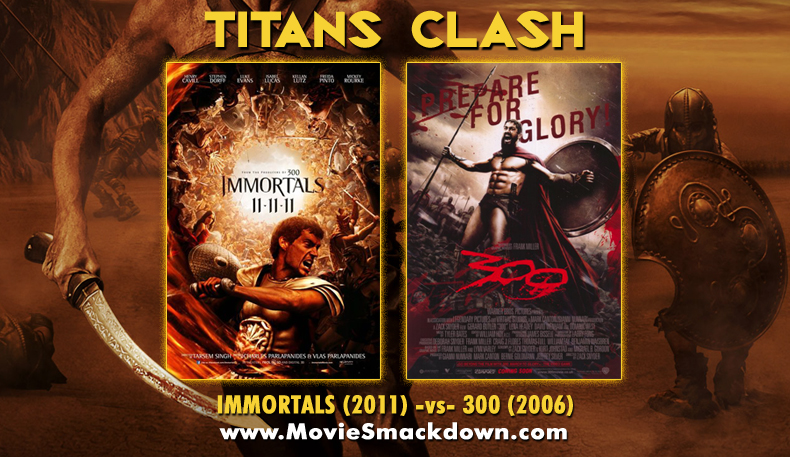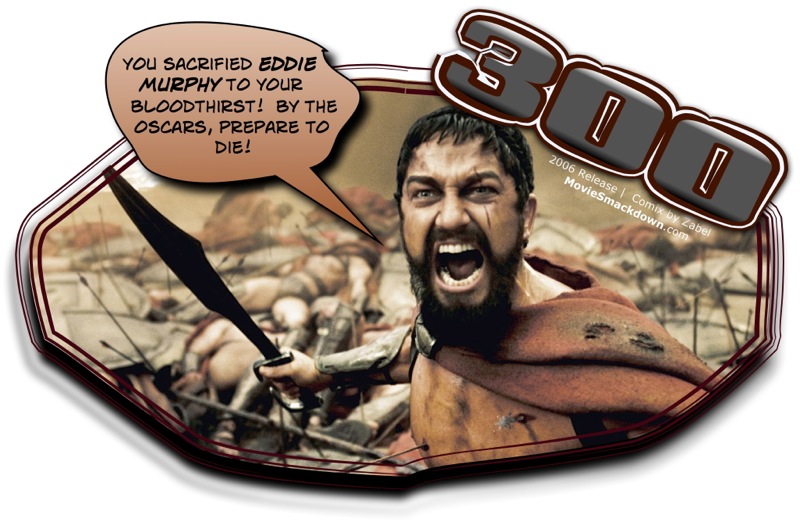
The Smackdown
With 11/11/11 upon us, the cinematic powers-that-be saw fit to unleash upon the world a new take on the legends of gods, men and color-coordinated ancient civilizations. While the distributors didn’t find a way to release Immortals at precisely 11:11 a.m., the film is nevertheless set to give Grecophiles everywhere a timeless chance to wet their whistles afresh at the trough of glorious battle.
No sword-and-sandals adventure flick worth its desert sand should be allowed its entrance into the temple of cinema without fighting its way inside. To that end, none other than 300 and the brave sons of Sparta will serve as guardian at the doorway and our Smackdown’s defending champion. Actually, these two films share quite a bit in common. Both involve a male hero forced to fight against an almost invincible invading army for the preservation of Greece. Both feature heavily stylized visuals with an extensive use of color correction, slow motion and computer-generated imagery.
Furthermore, both feature Greek men with impossibly waxed chests and little togas. Can’t forget those.
 The Challenger
The Challenger
Immortals is an adaptation of the myth of Theseus (Henry Cavill, sans Superman costume), the legendary founder of Athens . . . with some significant adjustments. Here, he’s a young atheist peasant who lives with his mother, a devoted believer in the ancient Greek gods, from the small town of Kappos. Their quiet life is disrupted by the invasion of Crete’s King Hyperion (a chillingly effective Mickey Rourke) in his plot to conquer Greece by finding and using the long-lost Epirus Bow, the single most powerful weapon in the known world.
After witnessing the brutal death of his mother at the hands of Hyperion, Theseus finds himself on the run with Phaedra (Freida Pinto), a virgin Oracle and a motley crew of others in a quest to stop Hyperion before he uses the bow to free the long-enchained Titans from Mount Tartarus. All the while, the trials of men are watched by ever-vigilant gods of Mount Olympus, forbidden by Zeus, their king, from interfering unless the Titans are released.
 The Defending Champion
The Defending Champion
Originally conceived and created by Frank Miller as a limited series of comic books, 300 is the story of the Battle of Thermopylae in 480 B.C., a conflict that’s become known as the patron saint of hopeless causes. When Persia’s King Xerxes I (Rodrigo Santoro, but I would swear that it’s Javier Bardem’s voice) demands that the Greek warrior-state of Sparta submit itself to him and become a part of his empire, Sparta’s King Leonidas (Gerard Butler) doesn’t take too kindly to the idea of a lifetime of subservience. One problem: By law, no Spartan king is permitted to go to war without the approval of the Ephor priests, and the one thing they won’t give him is their blessing.
Not to be outdone, Leonidas takes 300 of his best troops and goes north to the coast to fight the oncoming armies of the God-King in the Hot Gates, a small pass between sharp rocks and the sea where the Persian numbers mean nothing. Meanwhile, Queen Gorgo (a fierce, wonderfully warm Lena Headey) works against time to get the Spartan Council to approve the deployment of the entire Spartan army before it’s too late.
The Scorecard
Coming at things from a purely visual perspective, Immortals’ director Tarsem Singh is one of the best in the business. I’ll never forget the wonder I felt upon seeing The Fall (2006) on the silver screen, knowing that the extraordinary images were almost entirely genuine and hadn’t been enhanced by digital trickery. Where Singh has fallen short in the past is on the narrative level. Despite that film’s visual wonders, it has been kept from a place on the all-time list by a somewhat subpar plot.
I wish I could say that things had been fully rectified on that front with Immortals, but, unfortunately, that’s not the case. Certain lines of dialogue are remarkably clunky, and I’m really not sure who decided that certain set-pieces were a good idea. For example, when Hyperion’s army is charging full-tilt toward the breached gate of the fortress where the Greek army is holed up, Theseus takes it upon himself to give THE TALK. You know, the “Come on, men! Fight for your homes, your women, the freedom of all mankind†talk. Working from a script by Vlas & Charley Parlapanides, Singh stages the scene to play more like a high school pep rally than a motivational speech given by a budding leader. Seriously, the throng of men (who, I might add, would have had no way of hearing him with all the noise they were making) go in an Athens minute from not caring what this guy says to enthusiastically banging their pom-poms — sorry, shields — and shouting about how brave they feel.
That’s not to say that 300’s script, penned by Kurt Johnstad, Michael B. Gordon and director Zack Snyder (from the graphic novel by Miller and Lynn Varley), is a seamless action screenplay worthy of someone like Tony Gilroy. There are moments where the pervasive voice-over narration gets a bit silly, and there are some laughable liberties taken with history, like the idea that Sparta saw itself as the first great hope for spreading democracy throughout the world. Sorry, guys, that was Athens. Sparta was always the really, really mean older brother, and not much more than that.
However, one thing that sets these two films apart is the level of emotional investment they encourage. The relationship between Leonidas and Gorgo is established very early on in 300 and is repeatedly reinforced. Even as they’ve risen to be a strong warrior king and queen, it’s clear their great passion is the love they share. Conversely, the relationship between Theseus and Phaedra in Immortals never really goes beyond the action-movie cliché of “right time + right place = eternal love.â€
Furthermore, while both films make considerable use of bloody, slow-motion fight sequences, Immortals crosses the line into gratuitous indulgence that 300 avoids. It’s entirely possible to use violence as a tool toward a greater end, and recent films like Inglourious Basterds (violence as humor) and Sweeney Todd (violence as surreal artistic expression) have done so  without being needlessly grotesque. Unfortunately, particularly toward the end of the film, Immortals’ action degenerates into a series of pornographically bloody exploding heads, spewing slit throats, and vividly vivisected bodies, all in stylized slow-mo to let the audience savor the carnage.
Furthermore, while 300’s wonderfully color-coordinated warrior gear might be an initial stretch, it never gets to the bad Gucci promo-campaign-style plastic armor that the gods get stuck with in Immortals. Oy, vey.
The Decision
The veins of Greek history, both mythological and historical, are rich indeed, and, with the advent of increasingly realistic VFX technology, it’s now more possible than ever to craft a fully immersive experience based on a timeless legend/story — witness 2000’s Best Picture Oscar-winner, Gladiator. Nonetheless, in the grand Smackdown between our two current combatants, only one film manages a blend of convincing characters, impressive action sequences, and a hint of true heroism, and that film is 300.
Now, is there any way we can get Leonidas in the ring with Theseus on pay-per-view?






Leave a Reply